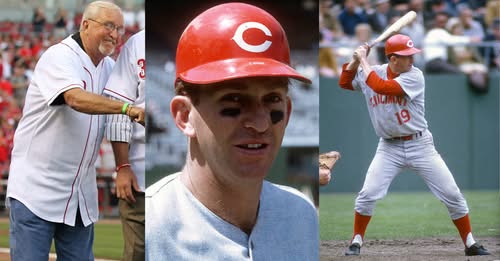Tommy Helms, Legendary Cincinnati Reds Second Baseman, Two-Time All-Star, and 1966 National League Rookie of the Year, Dies at 83 After a Storied Career Marked by Defensive Brilliance and Leadership
Baseball has lost one of its classic-era stars with the passing of Tommy Helms, the former Cincinnati Reds second baseman whose steady glove, grit, and old-school approach to the game earned him respect across the Major Leagues. Helms died at the age of 83, according to a statement from his family released Tuesday. The cause of death has not been publicly disclosed.
A two-time All-Star and the National League Rookie of the Year in 1966, Helms was part of a generation of baseball players who defined the sport in the 1960s and 1970s with a focus on hustle, defense, and teamwork. Known for his quiet leadership and professionalism on and off the field, Helms played 14 seasons in the Major Leagues and left a legacy rooted in consistency and class.
A Steady Hand in Cincinnati
Born May 5, 1940, in Charlotte, North Carolina, Tommy Vann Helms was raised in a working-class family where sports played a central role. He signed with the Cincinnati Reds in 1959 and worked his way through the minors before making his Major League debut with the Reds in 1964. By 1966, Helms was firmly entrenched in the Reds’ infield and won Rookie of the Year honors, posting a .284 batting average and providing rock-solid defense at second base.
Helms became a vital part of the Reds’ lineup during the mid-1960s through the early 1970s, including during the early days of what would become known as the “Big Red Machine.” While many of his more famous teammates such as Pete Rose, Johnny Bench, and Joe Morgan grabbed headlines, Helms remained a reliable and underrated contributor to the team’s success.
He earned All-Star selections in 1967 and 1968 and was recognized with two Gold Glove Awards for his defensive prowess. Known for his quick hands, smart positioning, and sure arm, Helms turned double plays with elegance and efficiency. He wasn’t a power hitter—he only hit 34 home runs in his career—but his bat was consistent, and he excelled at moving runners and doing the small things that helped teams win.
A Veteran Presence and Later Career
In 1971, Helms was part of a blockbuster trade that sent him, Lee May, and Jimmy Stewart to the Houston Astros in exchange for Joe Morgan and others—one of the most consequential trades in baseball history, as Morgan would become a Hall of Fame centerpiece of the Reds’ World Series runs. Helms spent four seasons with the Astros and later played for the Pittsburgh Pirates and Boston Red Sox before retiring in 1977.
Though his playing days ended, Helms continued to influence the game through coaching and management. He served on the Reds’ coaching staff during the 1980s and even took over as interim manager in 1988 and 1989. Though his stints as skipper were brief, he remained a respected figure in the Reds organization and was often called upon for guidance and mentorship.
Helms was known for his no-nonsense approach to baseball. He believed in discipline, fundamentals, and playing the game the right way—values he passed down to younger players throughout his post-playing career. He was inducted into the Cincinnati Reds Hall of Fame in 1979, a fitting recognition of his contributions to one of baseball’s most storied franchises.
Remembered Beyond the Stats
While Helms may not have had the flash or fame of some of his peers, he earned widespread admiration for his dependability, work ethic, and deep knowledge of the game. Former teammates and opponents often described him as a player’s player—a guy who showed up every day, did his job without complaint, and made his team better just by being there.
“He was the glue guy,” said former Reds teammate Johnny Bench in a statement. “You never had to worry about Tommy. He was always where he needed to be, making the right play, doing what it took to win. He was a pro in every sense.”
Fans in Cincinnati remember him as a cornerstone of the team’s pre-championship years and a bridge between generations of Reds baseball. Many still recall watching him turn a double play or slap a single through the infield with precision and poise.
Helms is survived by his wife of more than 60 years, his children, grandchildren, and great-grandchildren. His family has asked for privacy during this time and will announce details of a public memorial at a later date.
A Legacy of Quiet Greatness
Tommy Helms may not have chased the spotlight, but his impact on the game of baseball was undeniable. In an era where numbers and flair often dominate the conversation, Helms stood as a reminder that greatness can also be found in the quiet, steady rhythm of a career built on reliability, defense, and devotion to team.
As the baseball world says goodbye to one of its enduring gentlemen, fans and former players alike are taking time to honor the memory of a man who exemplified the best of the game—on the field and beyond.
Rest in peace, Tommy Helms. Your glove, grit, and grace made the game better—and you will not be forgotten.

